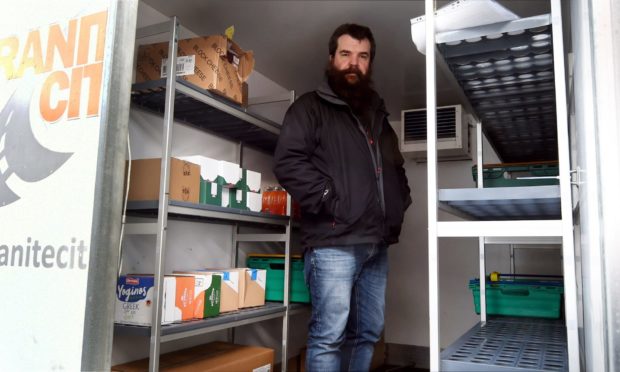Aberdeen charity bosses have reacted with caution to the energy price freeze saying more needs done to help tackle long-term poverty.
Liz Truss announced energy bills for the average UK household will be frozen at no more than £2,500 from October 1.
The prime minister’s two-year plan will save the average household around £1,000 from October and protect billpayers from further expected rises over the coming months.
However, there are fears it’s not enough to help those already in poverty and struggling.
More should be done
Christians Against Poverty (CAP) Aberdeen debt centre manager Ben Clift said: “We have been campaigning for the Scottish and wider UK Government to address the already existing crisis with a solution that is meaningful and long-term.
“Even though this short-term measure through borrowing relieves the pressure in a small way, any increase in bills at all is likely to push people further into poverty and towards harder decisions about what to spend money on, as well as unmanageable debt.
There must be more that the government can do.”
Ben Clift, CAP Aberdeen debt manager
“Everyone is looking to cut down on excess and luxuries but most of our clients don’t have any wiggle room at all.
“There must be more that the government can do.”
Under the current domestic energy cap, households face average bills of £1,971 but this was set to rise to £3,549 in October – and forecasts have suggested it could hit as high as £7,700 by April 2023.
Ms Truss told MPs: “This is the moment to be bold. We are facing a global energy crisis and there are no cost-free options.”
People ‘already struggling’
Recently the boss of Langstane Housing Association warned residents have been requesting their gas be shut off in a desperate attempt to save cash.
She estimated at least 104 social housing tenants in the north-east had already capped their gas supply ahead of the government’s intervention.
Aberdeen charity Instant Neighbour community connector and foodbank manager Evan Adamson believes there are still “long-term concerns”.
He said: “This cap will definitely be welcome but it’s still a rise in current prices and people are already really struggling.
“I really worry for those on prepaid meters as we approach winter and colder weather meaning utility use will rise significantly for everyone and those who pay as you go for gas and electric will see significant rises in their monthly costs at a time when people literally can’t afford current costs.
This cap will definitely be welcome but it’s still a rise in current prices and people are already really struggling.”
Evan Adamson, Instant Neighbour community connector and foodbank manager
“The long term also concerns me – who will be hit with paying back such a huge aid package and when will this come into effect?
“The current uncertainties I am seeing from the public will carry on and continue to see people panicking and seeking help and aid as they start to worry about what the future brings.”
Still a ‘worry’ for those in poverty
Mr Adamson believes more still needs to be done to help those receiving benefits.
He added: “There is still a desperate need to look at benefit levels and minimum income thresholds and I worry that the sheer mention of billions of pounds of help towards energy immediately becomes an ‘out’ for the government to ignore these more important long-term issues where they can say that the amount of help put in place now will mean looking at these issues are unaffordable, unattainable and frankly impossible.
“Like I say, this does offer a little immediate relief to those who were in the position to be worried about the original proposed increases putting them into poverty.
“But for those who are already struggling and unable to pay their utility bills it is basically of no consequence as they are already struggling and their costs will definitely rise above current levels.”
Mr Clift added: “From a local perspective, we are hoping that investment in local energy production will have a positive effect on the economy of the north-east of Scotland, but we fear that it will be too late for that possible investment and potential economic growth to have a real impact on the most vulnerable in society.”


Conversation